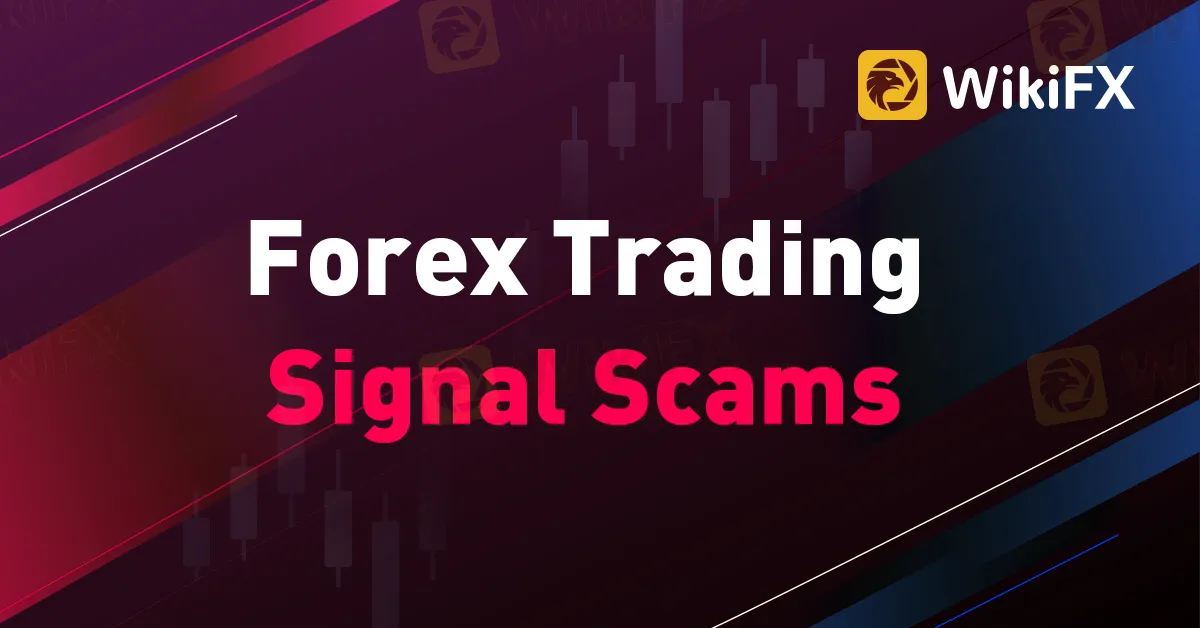简体中文
繁體中文
English
Pусский
日本語
ภาษาไทย
Tiếng Việt
Bahasa Indonesia
Español
हिन्दी
Filippiiniläinen
Français
Deutsch
Português
Türkçe
한국어
العربية
Forex Trading Signal Scams
Abstract:Forex trading signal scams are a prevalent issue in South Africa, as in many other countries. These scams typically involve companies or individuals claiming to have a system or strategy that can consistently generate profits in the foreign exchange market. The scammers will often charge a fee for access to their signals or trading system or require traders to open a trading account with a specific broker in order to receive the signals.

Forex trading signal scams are a prevalent issue in South Africa, as in many other countries. These scams typically involve companies or individuals claiming to have a system or strategy that can consistently generate profits in the foreign exchange market. The scammers will often charge a fee for access to their signals or trading system, or require traders to open a trading account with a specific broker in order to receive the signals.
The WikiFX app is the finest resource for finding a broker in South Africa. A forex broker search program that handles all the work for you is called WikiFX. On the app, traders can access all regulatory data, rates, and evaluations. The Play Store and AppStore both sell the WikiFX app.
One common tactic used by forex signal scams is to provide traders with a small number of winning trades in order to entice them to invest more money. Once the trader has invested a significant amount, the scammers will often stop providing profitable signals and instead provide a series of losing trades. This can result in significant financial losses for the trader.
Another tactic used by forex signal scams is to use fake or misleading testimonials to convince traders that their system is profitable. These testimonials are often fabricated or provided by paid actors, and do not reflect the actual experiences of traders who have used the system.
To avoid falling victim to a forex trading signal scam, it is important to thoroughly research any company or individual offering a trading system or signals before investing any money. It is also important to be wary of any company or individual that makes unrealistic or overly-optimistic claims about the potential profits that can be generated by their system.
Additionally, it is important to remember that no trading system or signal can guarantee profits, and that trading in the foreign exchange market carries a significant level of risk. As such, it is important to only invest money that you can afford to lose and to have a well-defined risk management strategy in place.
In summary, forex trading signal scams are a prevalent issue in South Africa and traders should be cautious and do their research before investing in any system or signal. No system can guarantee profits and trading in forex market always carries a level of risk, so traders should invest only what they can afford to lose and have a well-defined risk management strategy in place.

Disclaimer:
The views in this article only represent the author's personal views, and do not constitute investment advice on this platform. This platform does not guarantee the accuracy, completeness and timeliness of the information in the article, and will not be liable for any loss caused by the use of or reliance on the information in the article.
Read more

Georgia Man Charged in Danbury Kidnapping and Crypto Extortion Plot
Georgia man James Schwab charged in Danbury kidnapping tied to $230M crypto heist. Plot targeted couple for ransom after Miami altercation with son.

Galaxy Digital Settles $200M in Luna Token Manipulation Case
Galaxy Digital pays $200M to settle Luna token manipulation probe by NY regulators, linked to TerraUSD’s 2022 crash, impacting crypto market stability.

USD/INR, USD/PHP Forecast April 2025
The global forex markets are bracing for April 2025 with divergent forecasts for key emerging market pairs. In particular, the USD/INR and USD/PHP pairs have attracted significant attention amid a mix of central bank interventions, evolving U.S. policy signals, and regional economic shifts. In this article, we review multiple forecasts, examine the driving factors, and outline what traders might expect as the month unfolds.

April Forex Trends: EUR/USD, GBP/USD, USD/JPY, AUD/USD, USD/CAD Insights
Know April’s forex seasonality trends for EUR/USD, GBP/USD, USD/JPY, AUD/USD, and USD/CAD. Historical insights and key levels to watch in 2025.
WikiFX Broker
Latest News
Exposing the Top 5 Scam Brokers of March 2025: A Closer Look by WikiFX
Gold Prices Climb Again – Have Investors Seized the Opportunity?
Webull Launches SMSF Investment Platform with Zero Fees
Australian Regulator Warns of Money Laundering and Fraud Risks in Crypto ATMs
The Withdrawal Trap: How Scam Brokers Lure Victims into Paying More
FCA to Investors: Think Twice Before Trusting These Brokers
Trump\s tariffs: How could they affect the UK and your money
Trump gambles it all on global tariffs he\s wanted for decades
HTFX Spreads Joy During Eid Charity Event in Jakarta
How Will the Market React at a Crucial Turning Point?
Currency Calculator







